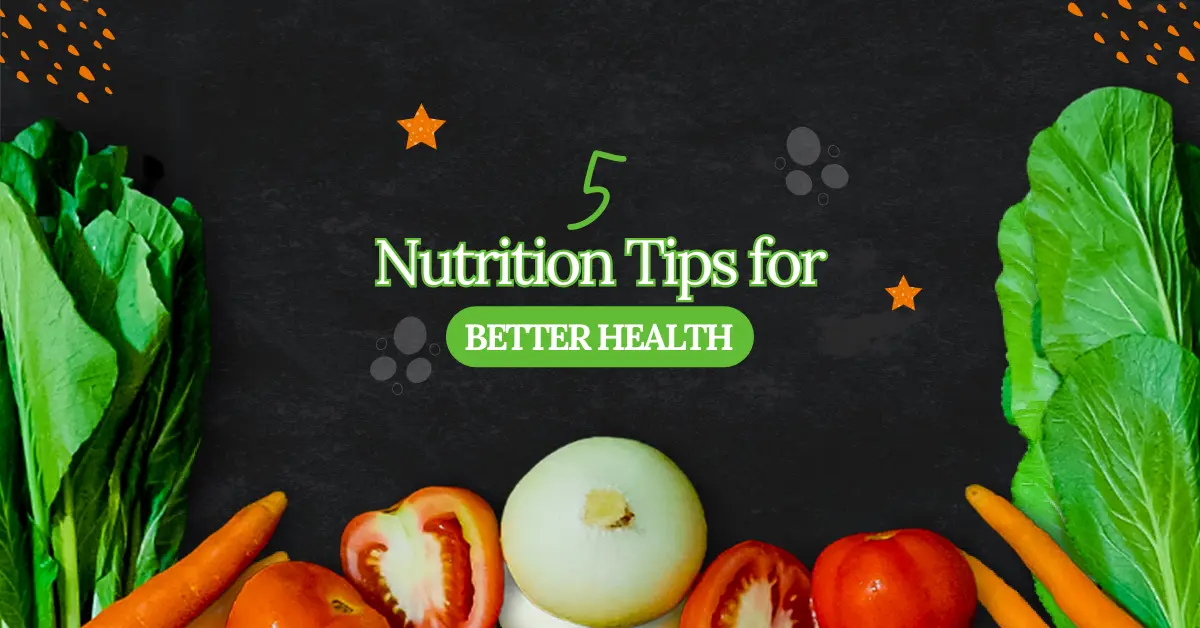
Good nutrition is essential for maintaining good health because it provides your body with the nutrients it needs to function properly. Eating a balanced diet helps improve your energy, boosts your immune system, and reduces the risk of diseases like diabetes, heart problems, and obesity. Following healthy eating tips, such as including a variety of fruits, vegetables, proteins, and whole grains in your diet, ensures that you get the right balance of nutrients. Adopting these habits can lead to better overall well-being, helping you stay active, fit, and mentally alert throughout your life.
5 Nutrition Tips for Better Health
Eating well is one of the best things we can do for our health. Good nutrition helps us feel better, have more energy, and stay healthy. But with so many details out there, it can be difficult to know where to begin. Don’t worry! We’re here to help with 5 simple nutrition tips for better health that can make a big difference in your fitness.
Eat More Colorful Fruits and Vegetables

Fruits & vegetables are packed with vitamins, minerals, and fiber that our bodies require. They’re like nature’s multivitamins! The more colorful your plate, the better. Each color gives us different healthy things called nutrients.
Here are some ideas to add more fruits and veggies to your meals:
- Add berries to your daybreak cereal or yogurt
- Snack on carrot sticks or cucumber slices
- Have a side salad with lunch and dinner
- Add vegetables to your sandwiches (like tomatoes, lettuce, or bell peppers)
- Try new fruits and veggies you haven’t eaten before
For those who enjoy Indian cuisine, there are many tasty ways to include more vegetables:
- Add extra vegetables to your dal (lentil soup)
- Try vegetable-packed dishes like mixed vegetable curry or aloo gobi (potato and cauliflower curry)
- Enjoy a side of raita, which often includes cucumber and tomatoes
- Snack on sliced fruits like mango, papaya, or guava
Remember, frozen fruits and vegetables are just as healthy as fresh ones and can be more affordable. They’re picked at their ripest and frozen right away, which keeps all the good stuff in.
Choose Whole Grains Over Refined Grains

Whole grains are much better for us than refined grains. They have more fiber, vitamins, and minerals. Fiber helps us feel full, keeps our digestion working well, and can even help lower cholesterol.
Here are some ways to add more whole grains to your diet:
- Switch from white bread to whole wheat bread
- Try brown rice instead of white rice
- Use whole wheat pasta in place of regular pasta
- Have oatmeal for breakfast
- Go for cereals that list a whole grain as the foremost component
For those who enjoy Indian foods, try these whole-grain options:
- Choose whole wheat roti or chapati instead of naan
- Try brown rice biryani instead of white rice versions
- Enjoy dishes made with whole grain millets like bajra (pearl millet) or ragi (finger millet)
- Use whole wheat atta (flour) for making rotis and parathas
When shopping, look at food labels. The first ingredient should be a whole grain, like whole wheat, oats, or brown rice.
Pick Lean Proteins

Protein is important for building and repairing our bodies. It also helps us feel full. However, some protein origins are more beneficial than others. Lean proteins have less unhealthy fat.
Good lean protein choices include:
- Chicken or turkey breast (without the skin)
- Fish and seafood
- Eggs
- Beans and lentils
- Low-fat dairy products
- Lean cuts of beef or pork (look for words like “loin” or “round”)
For vegetarians and those who enjoy Indian cuisine, here are some great protein options:
- Dal (lentil soup)
- Chana masala (chickpea curry)
- Paneer (a type of fresh cheese)
- Tofu
- Rajma (kidney bean curry)
Try to have a source of lean protein with each meal. This can help you feel complete and satisfied.
Limit Added Sugars

Too much-added sugar isn’t good for our health. It can lead to weight gain and other fitness issues. The tricky part is that added sugars are in many foods we might not expect.
Here are some tips to cut down on added sugars:
- Drink water, unsweetened tea, or low-fat milk instead of sugary drinks
- Choose fresh fruits for dessert instead of cookies or candy
- Read food labels to spot added sugars (look for words ending in “ose” like fructose or sucrose)
- When baking, try using less sugar or substituting with mashed bananas or applesauce
- Choose plain yogurt and add your fresh fruit instead of buying flavored yogurts
For those who enjoy Indian sweets, which are often high in sugar:
- Have smaller portions of traditional sweets like gulab jamun or jalebi
- Try making healthier versions of desserts using dates or natural sweeteners
- Enjoy fresh fruit-based desserts like fruit chaat
Remember, it’s okay to have sweet treats sometimes. The key is to not have them every day and to keep portions small.
Stay Hydrated with Water

Consuming enough water is super necessary for our fitness. Water helps our body work properly, keeps our skin healthy, and can even help us eat less.
Here are some easy ways to drink more water:
- Carry a water bottle with you
- Sip a glass of water with each feed
- Eat foods with increased water content, like cucumbers, watermelon, and oranges
- Have a glass of water when you wake up and before bed
- If you don’t like plain water, try adding a slice of lemon, lime, or cucumber for flavor
For those who enjoy Indian beverages:
- Try unsweetened lassi (a yogurt-based drink)
- Enjoy nimbu pani (lemon water) without added sugar
- Drink coconut water for natural hydration
Most people need about 8 glasses of water a day, but this can vary based on your activity level, climate, and overall health.
Putting It All Together
These 5 nutrition tips might seem simple, but they can make a big difference in your health. Remember, you don’t have to switch everything earlier. Start with one small difference and create from there. Here are some ideas to get started:
- This week, try adding an extra serving of vegetables to your dinner each night
- Next week, switch from white bread to whole wheat bread
- The week after, try having fish for dinner twice instead of red meat
Over time, these small changes add up to big improvements in your nutrition and health.
It’s also important to remember that eating well doesn’t mean you can never have your favorite foods. It’s all about balance. If most of your meals are healthy, it’s okay to enjoy a treat now and then.
Lastly, everyone’s body is different. What performs well for one individual might not function as well for another. Pay concentration to how various meals cause you to feel. If you have any health conditions or concerns, it’s always a good idea to talk to a doctor or a registered dietitian before making big changes to your diet.
Dining well is one of the most useful things we can do for ourselves. It might take some time to get used to new habits, but your body will thank you. Start small, be patient with yourself, and remember that every healthy choice is a step in the right direction.
FAQs
Q: How many fruits and vegetables should I eat each day?
A: Try to eat at least 5 servings of fruits and vegetables daily. A serving is about a handful. This gives your body important vitamins and fiber to stay healthy.
Q: Is it alright to eat eggs every day?
A: For most people, eating an egg or two daily is fine. Eggs have good protein and nutrients. If you’re worried about cholesterol, talk to your doctor about what’s right for you.
Q: Do I need to take vitamin pills if I eat well?
A: If you eat a variety of healthy foods, you probably don’t need vitamin pills. But some people might need them. Question your doctor if you should take any vitamins.
Q: How can I cut down on sugar without giving up sweets completely?
A: Try eating smaller portions of sweets. Choose fresh fruits for dessert more often. Look for foods with less added sugar. It’s okay to have treats sometimes, just not every day.
Q: Is it true that I should drink 8 glasses of water every day?
A: Eight glasses is a good goal, but you might need more or less. Listen to your body. Drink when you’re thirsty. Your pee should be light yellow.
Also Read:
5 Types of Healthy Diet Food
7 Healthy Diet Plans to Improve Your Wellbeing
References:
https://en.wikipedia.org/wiki/Healthy_diet
https://www.ncbi.nlm.nih.gov/books/NBK587401/
https://pmc.ncbi.nlm.nih.gov/articles/PMC3471136/
Disclaimer:
The nutrition tips provided are for general information only, not medical advice. Consult a healthcare professional before changing your diet, especially if you have medical conditions. This information is not a substitute for personalized guidance.
Related post

7 Health Benefits of Assam Tea


